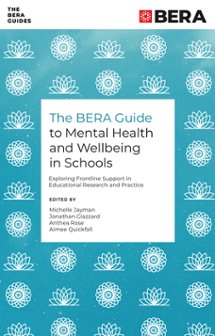
Index
ISBN: 978-1-83797-245-6, eISBN: 978-1-83797-242-5
Publication date: 21 August 2024
Citation
(2024), "Index", Jayman, M., Glazzard, J., Rose, A. and Quickfall, A. (Ed.) The BERA Guide to Mental Health and Wellbeing in Schools: Exploring Frontline Support in Educational Research and Practice (The BERA Guides), Emerald Publishing Limited, Leeds, pp. 203-209. https://doi.org/10.1108/978-1-83797-242-520241012
Publisher
:Emerald Publishing Limited
Copyright © 2024 Michelle Jayman, Jonathan Glazzard, Anthea Rose, and Aimee Quickfall
INDEX
- Prelims
- INTRODUCTION
- Chapter 1: Schools and the Mental Health Crisis: Education on the Frontline
- SECTION 1: CHILD AND ADOLESCENT MENTAL WELLBEING: THEORY, POLICY AND CRITICAL ISSUES FOR EDUCATION
- Chapter 2: Supporting Mental Health and Wellbeing in Schools: Policies and Approaches
- Chapter 3: Supporting the Support: Addressing Staff Mental Health
- Chapter 4: ‘Hear My Voice’: Children and Young People in Schools and Research
- Chapter 5: Online Support: Harnessing Technology for a Digital Generation
- SECTION 2: CASE STUDIES: SHARING GOOD PRACTICE FROM EDUCATION AND RESEARCH
- Chapter 6: Playful Pedagogies: Embedding Mental Health and Wellbeing in Primary Schools
- Chapter 7: Championing Co-Production: Developing Effective Mental Health and Wellbeing Strategies in Secondary Schools
- Chapter 8: Supporting the Mental Health and Wellbeing of Pupils with SEND in Schools
- Chapter 9: Relate, Place and Process: Creating Psychological Safety for Young People Disclosing Voice-Hearing in Educational Settings
- CONCLUSION
- Chapter 10: From Where we are Now to What Next: Concluding Thoughts and Future Directions
- Glossary
- Index